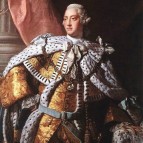
Born George William Frederick in 1738, King George III (1738–1820) succeeded to the British throne in 1760 upon the death of his grandfather, King George II. George III served longer than any preceding British monarch. His reign was punctuated by many military conflicts in Europe, the Americas, Asia, and Africa. It was under his leadership that England defeated France in the contentious Seven Years War, establishing England as the dominant European power of the era. During this time, however, Britain’s control over the American colonies began to wane. By the early 1770s, colonists unhappy with a lack of representation in Parliament began to establish self-governed provinces in defiance of George III. The colonists declared their independence from Britain and George III in 1776. Despite the counsel of many of his closest advisors, George III was unwilling to relinquish the American colonies for several years until rising costs and numerous military defeats forced him to acknowledge American sovereignty. The war ended in 1783 with the signing of the Treaty of Paris, to which George III is noted as saying, “I was the last to consent to the separation; but the separation having been made and having become inevitable, I have always said, as I say now, that I would be the first to meet the friendship of the United States as an independent power.” Suffering from dementia in his later years, George III died at the age of 81 in 1820.
